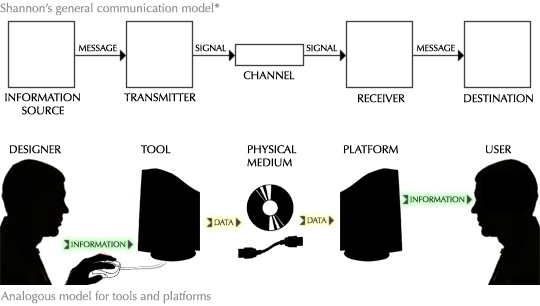Understanding and creation through research and intuition

Alan Moore: I have a theory of what is an inverse relationship between imagination and money. There will be in it. - I have a theory, which until now has not failed me, that the relationship between imagination and money is inverted. Because the more money and technology available to do the work, the less imagination will be invested in it.
Bret Victor: I can understand and create software
in unprecedentedly powerful ways. “ I intend to create software based tools to help people understand and create.”
I don’t know how to start this topic correctly and in which blog to post it, but here we’ll talk about non-standard interfaces and ways to present information.
This topic was divided into two topics. Here is the first part .
')
First you need to submit his site (Bret Victor), which contains all the ideas and research. Custom design catches the eye immediately. Here you can say a lot about how it is not readable or not informative enough, because when you open this page for the first time, you don’t immediately understand where you are and what all this is about. But this is just an “not for all” approach.
I really like his Zen way of learning , presented in the left column.
There are many works there, for each of which you can issue a separate translation-article. I’ll just catch a glimpse of some interesting ideas. In the end, the idea should be free, and a good idea should be doubly free.
Engineer output from the environment
Consider one of the simple ideas. Using software based tools we can receive information from the surrounding electronic environment. The simplest and most obvious information can be translated and displayed in some useful way.
Consider the following scenario: I received a letter from a friend of the following: “Man, do you want to eat pizza?”. Then I go, for example, to googlemaps and look for the nearest pizzeria.
But we have huge computational powers at hand. Why do we need to do extra manipulations and spend time on it when the program assistant can do it faster?
Suppose we have the following scheme:

We have data views and query processing components. Further we will look at the possible scenario in the presence of the existing toolkit:

We can say that this approach turns us into lazy people :) But then he frees us for doing more important things.
The collection of versatile information, such as geo-tags, names, calendar dates, locations, is already carried out by various global web services, like Facebook, VKontakte. But there is always room to grow, this is just one of simple examples. Plus, we don’t like it when outsiders know too much about us. But to have a similar functionality in your email client would be nice.
A little bit of everything
I will not list every single topic, you can see them yourself, just highlight some of them.
The idea of a scrub calculator . Incidentally, it was presented in a video from a previous article about a tool for creating video games.
***
Thoughts on the design of systems .
“In science, if you know what you are doing, you should not do that. In engineering, if you do not know what you are doing, you should not do that. In a rare case, if at all, we see adherence to these rules. ”
—Richard Hamming, The Art of Doing Science and Engineering
***
Interactive presentation of dynamic systems:
On this you can probably stop. I would like to tell you a lot more about non-standard and creative approaches to thinking and designing and sharing other interesting links to different approaches from different authors, but if you want and if you realize that there are such resources somewhere, you can find them yourself.
Create, create and share your ideas!
PS For those who love to criticize other people's work or say that the presented approaches are already “bayan”, I would say that there are people for whom this material may be of great interest.
Source: https://habr.com/ru/post/139484/
All Articles